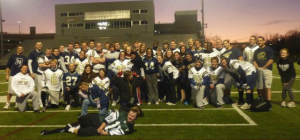For many young adults with intellectual disabilities, attending a college or university simply isn’t within reach. However, the career and community studies program at the College gives these students the opportunity to attend classes and participate in campus activities as any other college student would.

“(The CCS program) is a liberal arts course of study for students with intellectual disabilities who would not otherwise be admitted into college,” said Rebecca Daley, the director of the CCS program. “(It) gives these students the opportunity to engage in a college experience that is, as close as we can, mirrored to an experience any other student would have on this campus.”
At the College, students in the CCS program attend two different types of classes. CCS classes are specifically designed to support independent living skills, self-advocacy skills and skills they may need for adult living. In addition, they also take regular College classes, of which there are approximately 90 to choose from, that are based on their interest and career path.
Typically, students take one CCS class along with one TCNJ class each semester; however, some students take two TCNJ classes, depending on their ability to do well in those classes.
Each year, 10 students are accepted into the CCS program at the College. In addition to showing an apparent intellectual disability, prospective students must also show a willingness to learn.
“We are looking for students who have basic literacy and math skills,” Daley said. “But we’re looking for students who are highly motivated to go to college and who will show the social skill development and the motivation to attend classes like any other college student would.”
All CCS students live in one of nine off-campus houses that are all within walking distance of the campus. A house mentor, a typical student at the College, also lives in each CCS house in order to help problem solve, make sure each student is being responsible, and to be a role model of what a good college student needs to do to be successful.
“It’s a job that requires a lot of responsibility, but it’s also been very rewarding,” said sophomore house mentor Jon Michaels. “And you make new friends doing it.”
In addition to house mentors, the CCS program also provides academic mentors, job coaches and social mentors to help CCS students succeed. While academic mentors help students make the connection between what they’re learning in class and what their assignments are, social mentors help students become a part of the College community by making sure they are involved with clubs and other social activities on campus.
Eric Santora, a freshman in the CCS program, does intramural wrestling and is a member of the Harry Potter club, as well as Best Buddies.
In addition to social mentors, Best Buddies at the College is a chapter of an international organization that helps form friendships between students with disabilities and typically-developing students.
Through an interview process, students are paired with one or two “buddies” and these “buddy” pairs participate in social activities such as pumpkin picking, flag football with the varsity football team, game nights, holiday celebrations and the annual Buddies Ball.
All CCS freshman are required to participate in Best Buddies; their involvement after that is optional, but nearly all CCS students continue to participate in social events in the years following.
“Without a doubt, Best Buddies’ biggest accomplishment thus far has been its ability to form such strong, lasting friendships among its members,” said sophomore Best Buddies treasurer Niki Haas. “Alumni remain close to the organization, are still friends with their original buddies years later, and often come back to visit the current members.”
Through the CCS program, students with intellectual disabilities gain confidence, become more independent, and create lasting friendships among their peers.
“We see a huge increase in self-esteem and confidence that makes them more mature and more able to be independent and better problem solvers,” Daley said. “Our students become better self-advocates and more self-determined based on the confidence that they have developed over four years of saying, ‘I go to college.’”
In addition, the CCS program provides students on campus, especially in the education field, opportunities to understand disability, be with people with disabilities, and become better prepared as teachers.
“I think this type of experience strengthens who they’re going to be when they go into their occupations,” Daley said.
Overall, the CCS program gives students the opportunity to attend college just as any other student would.
“I think the kids in the program benefit greatly from it,” Michaels said. “Basically, they get a fun college experience … they have the opportunity to be like regular college students. It’s awesome.”






